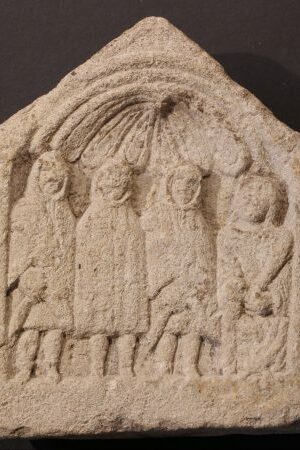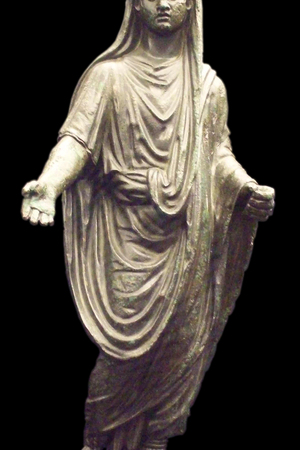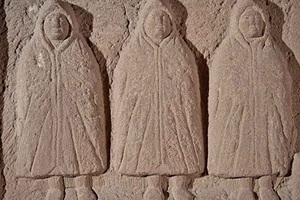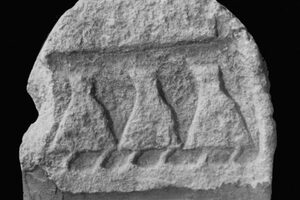Genius
Genius (Latin: genius, meaning "spirit") - in Roman mythology, these are guardian spirits that serve humans, objects, and places. They are responsible for the birth of their "wards" and determine the essence of a person or the atmosphere of an object/place. The Latin word genius is derived from gens, meaning "family" or "clan," and gigno, meaning "to give birth" or "to produce." In Roman art, the genius was depicted as a young man or a bearded man. Different areas had their own genii (spirits) of specific places (Latin: genius loci). There were also female counterparts to genii called "Juno," derived from the Latin word for youth. The symbol of genii and Juno was the serpent.
Belief in the existence of deities, spirits, and demons that protect humans is an ancient tradition found in cultures worldwide. It is believed that such spirits, like Juno and genii, could inspire individuals, imparting knowledge and endowing them with talents that make them surpass ordinary mortals. It is from these spirits (genii) that the concept of human genius emerged, which literally means the patronage of a benevolent spirit-genius. Genii and Juno also protected individuals from the influence of malevolent spirits that bring illness and misfortune.
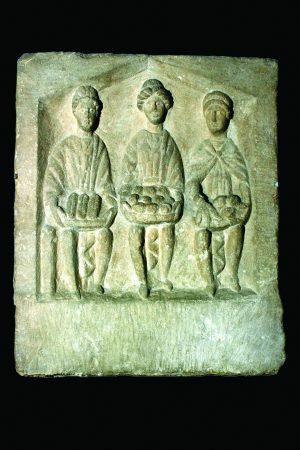 Romano-British bas-relief depicting the three genii cucullati. Found at Ashcroft, Cirencester. 1-2 century AD
Romano-British bas-relief depicting the three genii cucullati. Found at Ashcroft, Cirencester. 1-2 century ADEvery resident of Ancient Rome had their personal guardian spirit. As mentioned earlier, male spirits were called genii, while female spirits were called Juno. Genii and Juno were considered something like a person's second "self." They guarded the individual from birth, protected them from misfortunes and diseases, shaped their character, inspired them, and aided in their development. Thus, the concept of genius as the manifestation of a caring and benevolent guardian spirit, endowing individuals with special talents, emerged. On their birthdays, Romans would offer sacrifices to their genius, including incense, flowers, and wine. The genius of the head of the household held one of the most important places among the domestic gods.
Originally, genii and Juno were responsible for the continuation of the family line, as indicated by the origins of their names. This function was crucial, as the well-being and future of the family depended on the birth of children. Over time, genii transformed first into personifications of Roman virtues and merits and then into personal deities that were born with an individual, accompanied them until death, and remained near their place of burial.
In addition to personal genii, there were numerous genii of specific locations represented in the form of a serpent. The genii of places bore many similarities to Lares, and it is possible that in the minds of the Romans, these were similar entities. There were genii for provinces, communities, colonies, buildings, legions, and so on. There was a genius of the entire Roman people, whom every Roman respected alongside their personal genius. His statue stood in the Roman Forum, and on the Capitoline Hill, there was a pedestal dedicated to him with the inscription "To the Genius of the City of Rome, either male or female." There are two explanations for this inscription. The first version suggests that in ancient times, there was no distinction between male and female guardian spirits, while the second version suggests that the name and gender of the Genius of Rome were concealed to prevent enemies from exploiting them.
In later times, the genii of emperors gained special popularity. This tradition began with Octavian Augustus, who placed statues of his genius in all provinces of the Roman state. Since then, swearing an oath to the emperor's genii became a significant pledge in Rome, and violating it was considered an offense against imperial authority.
Related topics
Ancient Rome, Pontifex, Octavian Augustus
Literature
1. Geniuses // Encyclopedia of Brockhaus and Efron : in 86 volumes (82 volumes and 4 additions). - St. Petersburg, 1890-1907.
2. Guili R. E. Encyclopedia of Angels, Moscow: Veche Publ., 2008, 416 p. (in Russian). ISBN 978-5-9533-1941-6
3. Fosse Sh. Assyrian Magic. Translated from French by V. L. Sanin; translated from Akkadsk. and Shumersk by V. V. Yemelyanov. - St. Petersburg: Publishing Group "Eurasia", 2001. - 336 p — - ISBN 5-8071-0082-4
4. N. T. Babichev, Ya. M. Borovskoi. Genius loci / / Latin-Russian and Russian-Latin dictionary of winged words and expressions, Moscow: Russkiy Yazyk — 1982. / / Latin-Russian and Russian-Latin dictionary of winged words and expressions
5. Genii // Dictionary of Antiquity: translated from German / ed. by V. I. Kuzishchin, Moscow: Progress, 1989. — ISBN 5-01-001588-9.
